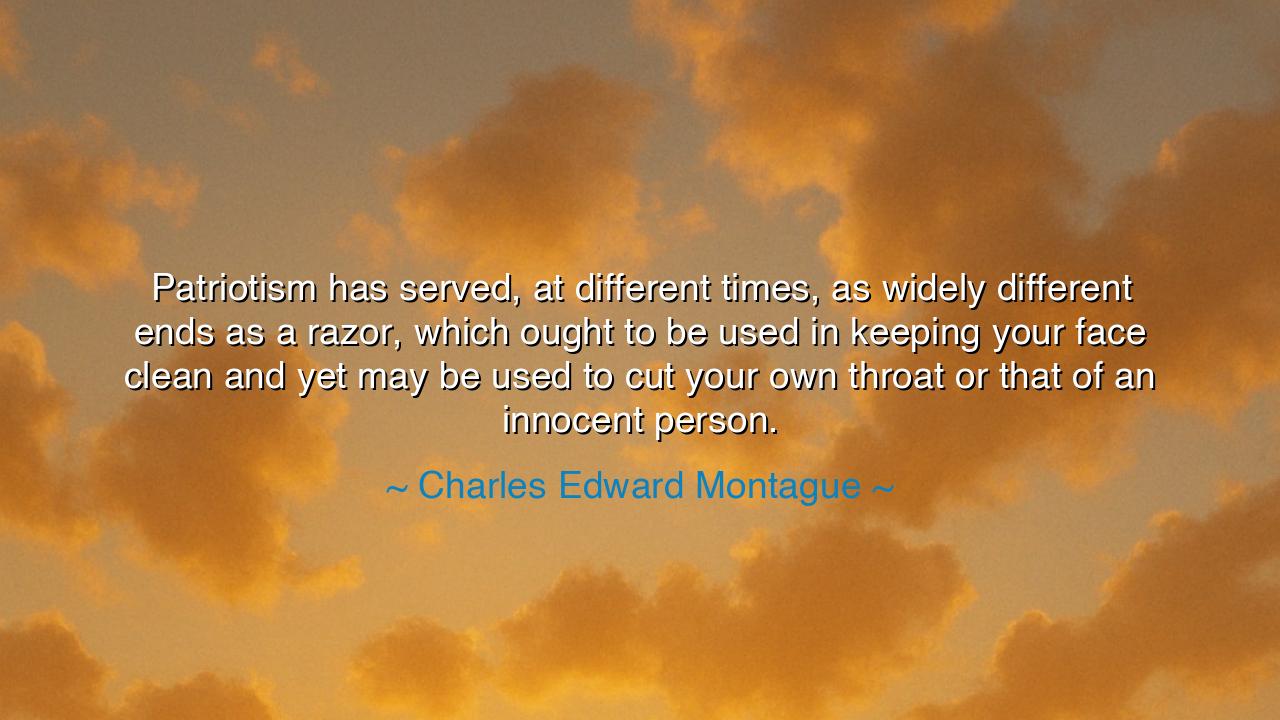
Patriotism has served, at different times, as widely different
Patriotism has served, at different times, as widely different ends as a razor, which ought to be used in keeping your face clean and yet may be used to cut your own throat or that of an innocent person.






Charles Edward Montague, the English essayist and veteran of the Great War, left us a warning veiled in wisdom: “Patriotism has served, at different times, as widely different ends as a razor, which ought to be used in keeping your face clean and yet may be used to cut your own throat or that of an innocent person.” In these words lies a truth sharp as the blade he names. Patriotism, like the razor, is a tool—capable of great good when rightly wielded, but also capable of dreadful harm when turned to folly or malice.
Montague knew this truth not from books alone, but from the battlefield. He had seen young men stirred by fervent speeches, their hearts ignited by banners and drums. He had watched them march into mud and fire, believing they fought for noble causes, only to be consumed by the machinery of war. Thus he likened patriotism to a razor: it can shave clean the selfishness of a people, reminding them to serve something greater than themselves; but it can also cut throats, deceiving men into cruelty, blinding them with rage until they destroy what they love most.
The lesson echoes across history. Consider the Crusades, when zeal for God and homeland drew thousands into battle. At its best, such fervor inspired bravery, sacrifice, and unity. At its worst, it justified bloodshed against innocents, cities burned, and lives shattered in the name of faith and flag. The razor of patriotism, once meant to preserve identity and defend home, became a weapon of conquest, turned against those who had done no harm. Thus Montague’s metaphor is no idle image, but a mirror to centuries of human folly.
Yet we must not despise patriotism itself, any more than we despise the razor. To shave clean, to present oneself in order, to keep one’s face free of neglect—these are right and proper uses of the blade. Likewise, to love one’s country, to defend its people, to cherish its freedom—these are noble uses of patriotism. Indeed, without such love, no nation can endure. The danger lies not in patriotism itself, but in its misuse: when leaders wield it to inflame hatred, when crowds let it become frenzy, when men forget that true love of country does not demand the destruction of others’ homes.
Montague’s words remind us of the thin line between devotion and destruction. A people united by love can build schools, feed the poor, and endure hardship together. The same people, misled by the twisting of patriotism into fanaticism, can turn neighbor against neighbor, and spill innocent blood. So it is with the razor: in steady hands, it refines; in reckless hands, it kills. Therefore, wisdom is needed, for the strength of a nation is not measured by how loudly its people shout their loyalty, but by how carefully they wield it.
From this teaching, a clear lesson arises: let your patriotism be tempered by justice and compassion. Love of one’s land should never mean hatred of another’s. Service to one’s country should never mean blindness to truth. If you feel your blood stirred by patriotic words, pause and ask: does this patriotism cleanse like a razor to the face, or does it threaten to cut the throat of the innocent? Only then will your devotion be pure, worthy of those who came before and those yet to come.
In practice, this means choosing deeds over slogans. Serve your community. Defend the weak. Honor the fallen not with reckless vengeance but with the building of peace. Teach your children to love their homeland not through contempt for others, but through gratitude, humility, and service. For true patriotism is not loud—it is steady. It is not savage—it is strong. And in this way, the razor remains in your hand, sharp but safe, ready to cleanse, not to destroy.
Thus Montague’s warning endures: the same blade that may honor you may also betray you. Let your patriotism be a shield, not a sword against the innocent. Let it guide you toward justice, not toward cruelty. And remember always, in the spirit of wisdom passed down like a sacred flame: a razor in wise hands makes a man noble, but in reckless hands it makes him dangerous. So it is with patriotism. Use it well.






AAdministratorAdministrator
Welcome, honored guests. Please leave a comment, we will respond soon